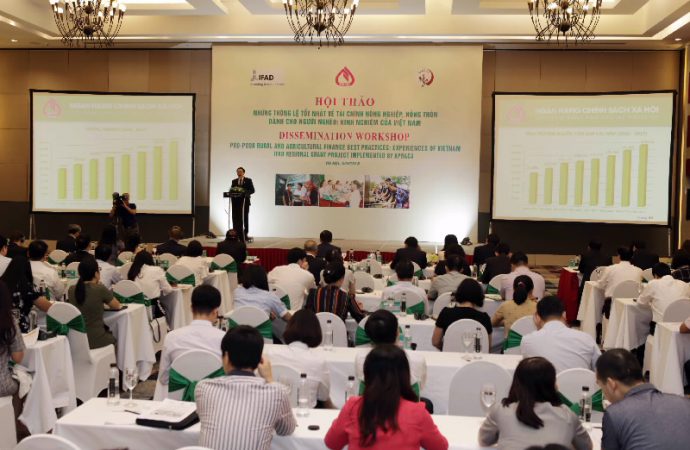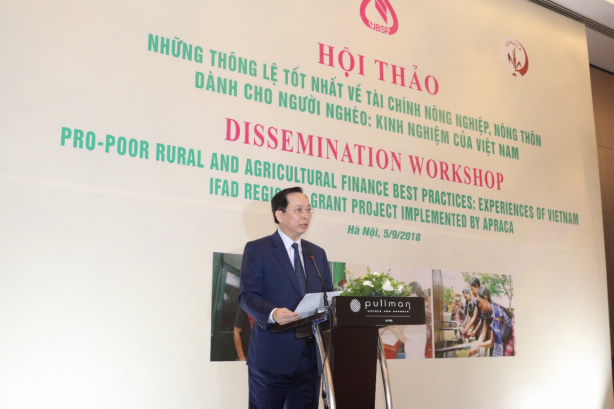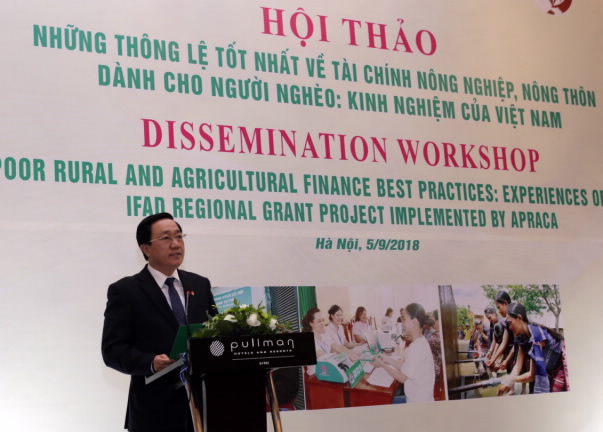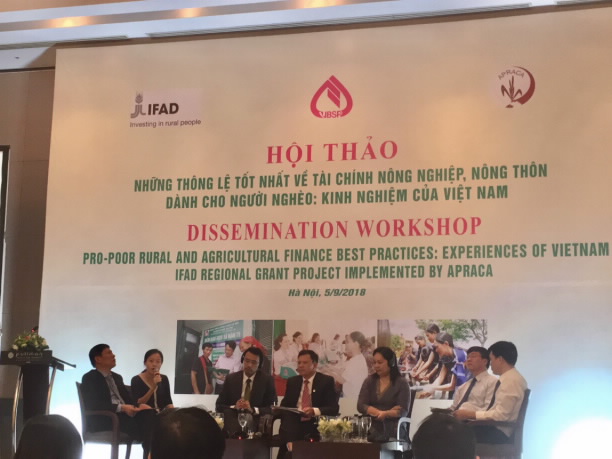(VBSP News) On September 5th, 2018 in Hanoi, Vietnam Bank for Social Policies (VBSP) in collaboration with the Asia-Pacific Rural and Agricultural Credit Association (APRACA)
(VBSP News) On September 5th, 2018 in Hanoi, Vietnam Bank for Social Policies (VBSP) in collaboration with the Asia-Pacific Rural and Agricultural Credit Association (APRACA), the International Fund for Agricultural Development (IFAD) organized the Dissemination Workshop titled “Pro-poor rural and agricultural finance best practices: Experiences of Vietnam”, which aims to share the experience in implementing agricultural and rural finance products and services for the poor in Vietnam. Deputy Governor of the State Bank of Vietnam (SBV) Dao Minh Tu attended and chaired the workshop.
SBV Deputy Governor Dao Minh Tu delivers opening remarks at the Workshop
Reviewing some outstanding results of the banking sector in the areas of agriculture, rural development and pro-poor, Deputy Director Dao Minh Tu mentioned:
Firstly, the system of mechanisms and policies on credit has been constantly innovated and improved in the direction of expanding both the subjects, limits and procedures for lendings in order to meet the demands for investment in agriculture and rural areas, creating jobs, step by step raising the living conditions and making strong, comprehensive changes in the rural, remote and ethnic minority areas. Good financial practices for agriculture and rural areas are being applied and innovated in line with the restructuring of the agriculture sector and new rural development, such as: agricultural value chain loans; loans for hi–tech agricultural applications; loans for organic agriculture, etc.
Secondly, the network of CIs involved in the provision of banking services for agriculture and rural areas has been continuously expanded in terms of size and network of diversified types of activities with 47 banks, 1,181 People’s Credit Funds, 27 non-bank credit institutions, 4 microfinance institutions, and jad become an effective channel of capital to every hamlet and village across the country. Modern banking products and services have received much attention for investment and innovation, creating favorable conditions for customers to access with low transaction costs, such as Internet banking, mobile banking …
Thirdly, the banking sector has concentrated on implementing measures to mobilize financial resources in the society to meet the needs of production and business development, and poverty reduction in agriculture and rural areas on the principle of separation between commercial credits and policy credits.
Fourthly, the banking sector has learnt from the experiences and applied flexibly to the practical conditions in Vietnam with the participation of the whole political system, mass organizations and non-governmental organizations. In particular, the financial practices for the rural areas have been implemented in a creative and effective way, such as: Lending through mass organizations (the Farmers’ Union, the Women’s Union, the War Veterans Association,…); community-based ‘borrowers and savers’ groups have been set up to provide community support and cohesion; transaction points at the commune level have been set up; stores for marketing of safeagricultural produce for poor women have been organized;…
As a result, credits for agriculture and rural areas, and for the poor have increased dramatically: Outstanding loans for agriculture and rural areas have increased by an average of 20% per year; policy credits have increased on average by 13% per year, fully, promptly, efficiently and effectively supplying capital for the comprehensive development of agriculture and rural areas.
VBSP is the largest bank in terms of coverage, helping poor households and policy beneficiaries easily access banking and financial services
Further clarifying the importance of rural and agricultural finance for the poor in the economic development, Mr. Duong Quyet Thang, General Director of VBSP said: In Vietnam, VBSP is a Government’s bank established to provide policy credits and other services to the poor and other social policy beneficiaries throughout the country. VBSP is currently the largest bank in terms of coverage in the banking system in Vietnam, ensuring poor households and policy beneficiaries in the rural, mountainous, remote and isolated areas, extremely difficult areas can easily access banking – financial services.
Mr. Duong Quyet Thang, General Director of VBSP speaks at the Workshop
Credit activities of VBSP timely and efficiently meet the demand for loans of the poor and the beneficiaries in the rural areas, contributing to poverty reduction, improving the living standards of farmers, gradually narrowing the income gap between the regions, and stopping usury in the rural areas.
Hence, Vietnam is recognized internationally as a country that has successfully implemented the Millennium Development Goals on sustainable development, poverty reduction and human development. The poverty rate of Vietnam was reduced from the very high 58% in 1993 down to 6.7% in 2017.
Viet Nam has actively participated in the development of agricultural and rural finance to bring about comprehensive development
At the Workshop, Dr. Prasun Kumar Das – Secretary General of APRACA shared: Over the years, Vietnam has been actively involved in the development of rural and agricultural finance to bring about comprehensive development nationwide and has adhered to the principles of the United Nations’ Sustainable Development Goals. APRACA has been supporting two Vietnamese banks (VBSP and Agribank) to build up their capabilities to achieve these goals through the exchanges of experiences with other organizations, through visits to learn from the most successful models and staff training. APRACA also supports two member organizations in Vietnam to build the rural institutions in order to provide credits for development and startups. APRACA is committed to supporting all initiatives in Vietnam to improve the credit flows in the agricultural sector to support those weather-dependent communities in the country.
The successful implementation of the Government’s policy credit programs in agriculture, rural areas and the poor is indeed a valuable experience that has been reviewed and documented in Vietnam over the years. Through this workshop, Vietnam’s banking sector updated the current situation and listened to recommendations from representatives of APRACA and other international organizations. The workshop was divided into two main sessions: (1) Pro-poor rural financial activities and impact on sustainable development in Vietnam; (2) Strategic replication of innovative pro-poor financial products and services in Vietnam.
Delegates exchanges at the Discussion Panel
During the sessions, the delegates, experts, researchers in Vietnam and abroad discussed on the evaluation and recognition of best rural finance practices in line with the socio-economic conditions in Vietnam; experiences of the organizations in APRACA and the assessment of the experiences associated with the specific socio-economic environment of each country, helping to develop the best practices for Vietnam; sharing experiences on specific results on credit’s impact assessment for agriculture and rural areas with particular attention to policy credits as an instrument to solve the problems that thecommercial banks’ credits have not successfully resolved; specific challenges for financial institutions at the national level to develop the appropriate models for each country…



















